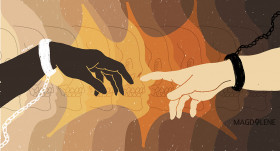Recently I received a text message from my son’s teacher. She asked me whether or not I had time to meet after school. I told her that my schedule was pretty packed and that I could not go, unless she needed to discuss a very important matter. It was not urgent, she replied, adding she did not mind discussing it via WhatsApp.
What she wanted to talk to me about was the topic that the kids were going to discuss the next week: family. She knew that my son does not “have” a father in the conventional sense. My son’s dad and I are not married, something that is still considered taboo in Indonesia. I was neither shocked nor upset to see the message. In fact, I was fully prepared for it. I had prepared myself for this moment since I found out that I was carrying a baby conceived with an American when I was miles away from home. I decided to keep the baby and not the dad, though I eventually put his name on my son’s birth certificate – a move that complicated our journey home, but that’s another story to tell.
So I told my son’s teacher that he knew he had a dad and the dad lived far away in the USA. I also told her that I tried my best not to make him hate his father. I explained how my son just learned the concept that family consists of a father, mother, and children last year. And when he got home, he said that he knew he was loved by his mom, aunt, and grandparents and that it was enough. It is still enough for him. The only thing about not having a father around that he complains about is that his mom cannot carry a baby brother for him.
This chat made me realize that we may need to start telling kids that there are different types of families in Indonesia. I know I am not alone, but I don’t know who else choose to walk the path that I walk out there. I remember a story of another elementary school teacher’s student who told the class about her dad in a very negative tone. When asked by another pupil where her dad was, she replied, “Papaku minggat.” My father left us.
The kid who asked might not understand that not all families are like hers, while the kid asked might not have received proper counseling to heal her broken heart. Both of them needed to understand what happens around them.
In one of my teaching resources book published in the USA, one section discusses the different types of family. This is good. Knowing different family types can help children be less prejudice against other kids who grow up in families different than theirs. There are kids who grow up with their grandparents away from their parents, kids who were adopted, kids who have to go from one parent to the other because of parental shared custody, and many others.
In Indonesia we are always told to follow the norms, which means follow what most people do. This is not necessarily bad, but we often forget that following the norms does not mean that everything will be perfect and OK. And instead of giving hands to those who need help, we judge and, as a result, put more burdens to those who are going through difficult journeys. A school’s lesson on family should not just stop at defining the family and its members, it should also focus on how we need to embrace respect, love and understand others. Teachers should never make kids think that families that do not look like what they see in the books are bad.
Maybe, just maybe, if we become more open to talk about the different kinds of families, women will feel freer to choose different paths, instead of succumbing themselves to marriage in order to accepted in a society that only sees a family as containing a mother, a father and children. Too many couples get married because of unplanned pregnancy. While some may have happy marriage lives, many suffer because the marriages are not based on a strong foundation.
The world is changing – there are more types of families out there than the ones we know. Taking this into account will teach children to embrace diversity. More importantly, it will transform society’s views to begin to see respect, understanding, and love as being more important than what can be seen on the outside.
Antonina Suryantari is a mother and an English instructor who loves writing. Writing is her way to reflect, learn and share. She is still reluctant to tell society about her relationship status. Nevertheless, she considers her son an angel gifted to help her make meaning of life.







Comments